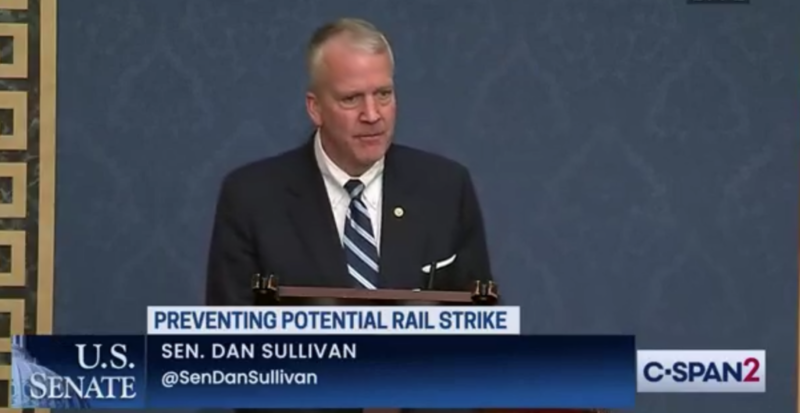Alaska’s congressional delegation splits on vote to block railroad workers’ strike

The U.S. Senate voted 80-15 on Thursday to approve a resolution that prevents workers in 12 Lower 48 railroad unions from going on strike. The measure, which passed the House earlier this week, now goes to President Joe Biden, who urged Congress to pass the measure.
Alaska’s three-person congressional delegation split on the proposal.
Sen. Lisa Murkowski, R-Alaska, voted in favor of the measure that forces workers and railroads to accept a labor agreement identical to one negotiated by Biden in September. That agreement, which includes a roughly 24% pay increase by 2024 and more time-off flexibility, was rejected by four unions whose membership represents more than half of the workers in the 12 unions considering a strike.
Sen. Dan Sullivan, R-Alaska, voted against the measure. Rep. Mary Peltola, D-Alaska, also voted against it when it passed the House earlier this week.
Union members have repeatedly complained about inadequate sick leave and company scheduling policies that prevent them from using accrued vacation time without punishment.
Railroads carry almost 30% of the nation’s cargo freight, and a strike could have disrupted shipping nationwide, though the Alaska Railroad would not have been significantly affected.
Peltola voted in favor of a separate resolution that would have amended the strike-busting measure to include a week of sick leave. That measure was adopted by the House.
In the Senate on Thursday, Sen. Bernie Sanders, I-Vermont, proposed adopting the House resolution with the Peltola-supported sick leave. In a speech, he noted the profitability of the railroad companies and said “corporate greed” was denying workers their sick leave.
Sanders’ proposal received 52 votes, but 60 were needed in the Senate for adoption. Sullivan and Murkowski voted against it.
Murkowski said in a prepared statement afterward that she has “great empathy for the rail workers and their efforts to negotiate paid sick leave. Ultimately, however, I recognize it is not Congress’ role to intervene in the details of labor negotiations. Doing so would set a bad precedent for other industries who are also negotiating contracts.”
She said voting in favor of the underlying resolution will avert a rail strike that “would have had severe economic and public health consequences” for the country.
Before the vote on sick leave, Sullivan proposed an amendment of his own, suggesting a 60-day “cooling off period” in which a strike would not be allowed.
He suggested that time could be used for further negotiations and noted that in 1986, Congress approved a similar break during a labor impasse.
“We don’t want Congress to become the future endgame for all contract negotiations,” Sullivan said.
His preferred proposal was defeated by a 25-70 vote.








